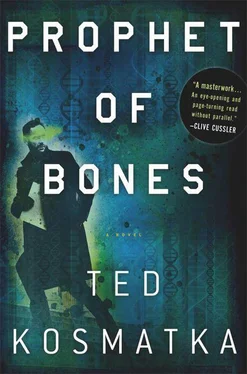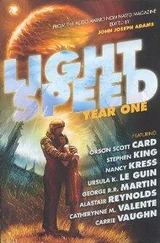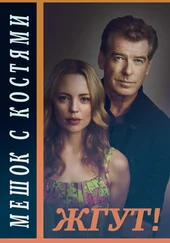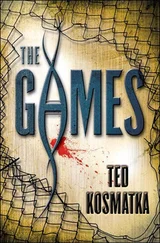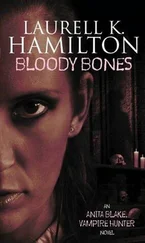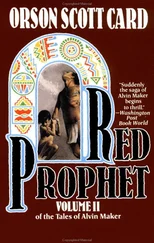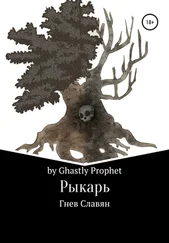“Proof of what, exactly?” the congressman said.
“Of the conspiracy. Of the suppression.”
“I’m listening.”
“We have a piece of bone.”
“The bone of what, exactly?”
“The bone of a tool-using hominid that isn’t human. A bone that Martial has conspired to keep hidden. A bone that he’s killed people to keep hidden.”
“Why?”
“Because his congressional benefactors wish it to remain so.”
“The churches, you mean?” The congressman looked at Gavin. He stopped cranking on his fishing pole. His lure sank deeper in the water until the ripple disappeared altogether.
Gavin didn’t answer.
“Where is it?”
“Not with us. Not here. But we have it.”
“A piece of bone,” the congressman whispered to himself, and then cast his line out into the water again.
“Yes.”
“It corroborates your story?”
“Yes. We also have a DNA sample and a flash drive with genetic results.”
“That might be something.”
Paul reeled his lure in.
The congressman’s face was unreadable now. Gone was the irritation, replaced by a blankness that seemed carefully cultivated. “I’ll need to make some calls.”
“Sir, you understand… we can’t—”
The congressman stopped Gavin with a raised hand. He reached into his back pocket and pulled out a phone.
“Disposable. Untraceable. Just answer it tomorrow morning when it rings. Wherever you are staying now, you need to move. Use a different hotel. Hell, leave town if you want. I don’t need to know where you are, but I need to know you’ll answer that phone when it rings. Can you do that?”
Gavin stared at him. “We can do that.”
“I was pretty sure you’d be full of shit,” the congressman said. “But I brought the phone just in case. It pays to be prepared.”
Gavin slid the phone into his front shirt pocket. They laid their fishing poles on the wet cement.
“Have a good afternoon, gentlemen,” the congressman said and cast his line into the water again.
“Good afternoon, sir.”
* * *
They walked the beach back toward the car. The fisherman stayed behind, as did the conspicuous men.
“A series of murders?”
Gavin nodded.
“You worked with him at this time?” Paul asked.
“Never directly. I was in the field. A lecturer at the university. I supplied bones, and he supplied money.”
“And my father?”
“He was there for a while, in the lab. And then he wasn’t. He left. Or tried to leave.”
“Tried to leave?”
They stepped off the sandy beach, up onto the hot concrete parking slab.
“He left,” Gavin said. “He got out. He did. When it got to be too much.”
Paul stopped. “He died of a heart attack.”
Gavin turned. “They all do,” he said. “All the ones who leave. The old man makes sure it looks like that.”
* * *
Paul and Lilli spent the night in a hotel overlooking the water. From their seventh-floor balcony they could see for miles. It was a better hotel than they’d grown accustomed to over the previous weeks. It would have been an unimaginable indulgence just a few days earlier, but now the cost of the room hardly mattered. The next couple of days would decide things one way or the other. Either way, their running had come to an end.
Gavin had chosen a different hotel, somewhere in the city.
“Best if you don’t know which one, exactly,” he’d said as he’d dropped them off at the entrance of their chosen lodging. “I’ll meet you back here in the morning.” Then he’d pulled away and was gone.
Paul and Lilli ate dinner at a nearby restaurant called the Crabble. They could pretend it was a date. It felt normal, and normal felt good.
Paul ate chicken wings.
“What do you think is going to happen tomorrow?” Lilli asked, swirling her drink. There was no reason not to get drunk, one last time.
“I don’t know.”
That night they slept in the same bed again, and in the morning Paul watched the sun rise.
He glanced over at Lilli’s still-sleeping form. The dress she’d bought now lay strewn near the foot of the bed. Her hair spiraled across the pillows, black as deepest space. Her eyes were open just a slit—a gap that never quite closed, even in sleep. He remembered it from college, those eyes that didn’t close, as if some part of her were ever watchful. He shook his head. Her watchfulness hadn’t been enough. Now she was in danger. And it was his fault.
He pulled his pants on and decided to go for a jog to release the tension. He left Lilli a short note on the back of hotel stationery, then took the elevator down to the first floor. The oppressive southern heat had yet to kick in. He got only about a half mile before he had to stop. He leaned against a light pole, catching his breath. He wasn’t a runner. Not by a long shot. He walked back, staying to the side of the road while cars passed him and the sun rose higher in the sky.
Back at the hotel, he found Lilli still sleeping, wrapped up in his rumpled white T-shirt.
When he got out of the shower, she had fewer clothes on.
* * *
They met Gavin downstairs around ten. He was eating the continental breakfast. Paul and Lilli each grabbed coffees, and they all headed out to the car. It was as gloomy today as it had been sunny the day before. Dark clouds threatened rain, but the pavement was still dry. They got to the car but didn’t climb inside, instead leaning against the trunk. The car sat near a ridge of trees at the edge of the parking lot. A breeze was blowing. They waited.
It was ten-thirty when the phone rang.
Gavin answered.
“Hello,” he said. “This is Gavin.”
There was a pause.
Gavin nodded—a reflexive movement wasted on the person on the other end of the line, but informative nonetheless to Paul. “Yeah,” Gavin said after a moment. “I can find it.” There was another long pause. “When?”
He nodded again and then looked over to Paul and made a scribbling motion with his hand. Paul found a notepad in the glove compartment, ripped off a piece of paper, and handed it to Gavin. He also dug a pen from the hotel out from his pocket and handed that over as well.
“Uh-huh,” Gavin said. “The congressman will be there?” He wrote something down on the paper. He stood up straighter.
“We have it,” he said. “We’ll bring it.” Another subtle nod. “I’ll hand it to him personally.”
He hung up.
“Well?” Paul asked.
Gavin looked at Lilli. “You have the bone sample with you?”
Lilli patted her purse.
“A place called Josami Park,” Gavin said. “Thirty minutes.”
* * *
Lilli MapQuested the location on her phone.
On the little screen, it appeared as an oval of green attached on one side to the sprawl of the city, 9.2 miles from their current location.
They climbed into the car and backed out of the parking spot. Ten minutes later, they left the main road, turning onto a side road that hugged a railroad track for a mile before crossing through an ungated entrance. JOSAMI PARK, the sign declared through an obstruction of overgrown weeds.
They took a winding drive past rusting swing sets, following the curve of the asphalt as it wound its way through a copse of dense trees. It was a quiet place. Out of the way. Deserted.
“I don’t like the look of this,” Paul said. He scanned the woods just beyond the roadway. It was too carefully isolated. Too private. The park’s name had the sound of a public place, but it wasn’t public. Not when you came down to it.
The road terminated in a narrow turnaround next to a small wooden pavilion that had seen better days. It had ostensibly been intended as a picnic area, though now it looked more like the kind of place where drug deals went down.
Читать дальше
